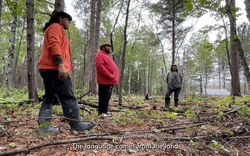For the third installment of In the Postcolony, a three-year thematic series facilitated through the CCA Master’s Students Program, participants of the 2022 cohort undertook a research project in collaboration with community members of the Algonquins of Barriere Lake First Nation as well as Shiri Pasternak, a long-time ally of Barriere Lake and a faculty member in Criminology at X University in Toronto. The three selected students engaged in research and put forward a project that responds to the community’s current initiative to build a multipurpose healing centre on their territory.
The community lives on a fifty-nine-acre reserve roughly three hours north of Ottawa, in what is now known as the Outaouais region of Quebec, though their traditional territories extend for seventeen thousand square kilometres. The healing centre will support community members recently released from prison while they wait for spots in long-term treatment centres. The community has currently deployed a temporary arrangement of retrofitted trailers to get community members back onto the land.
Over the course of the summer, students entered into conversation around how architecture and the built environment can support expansive definitions of well-being and healing, particularly those grounded in the land. They received support from Barriere Lake community members and Dr. Pasternak in engaging with the needs behind the multipurpose healing centre. The Algonquins of Barriere Lake are governed by the Mitchikanibikok Anishinaabe Onakinakewin, sacred laws that inform their relationships to each other and to the land. Students gained familiarity with ways of honouring the Onakinakewin through its manifestation in the built environment, and in community-based work that can deploy architecture as a practice that holds the capacity to heal the traumatic legacies of settler colonialism.
The CCA is committed to creating a safe, inclusive, and collaborative space for Indigenous and non-Indigenous students to foster questions around settler colonialism, Indigenous sovereignty, and architecture.
